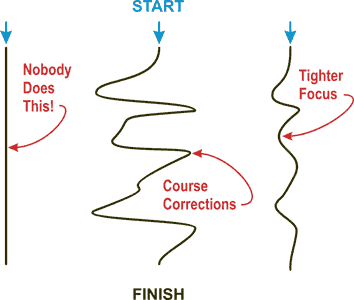|
|
|
 The
Marketing Mindset (Part 1) The
Marketing Mindset (Part 1) Are you "programmed" for success? Probably not. Most businesspeople and professionals aren't marketing-oriented (and therefore not success-oriented). They may be very good at their "jobs," but never developed that critical focus. As a sad result, they settle for much less personal income than they deserve for all the hard work they *already* put into their businesses. I'm going to help… with 12 high-payoff "factors" that'll have a huge positive impact on everything you do – in both your business and personal life. All are directed towards developing a "Marketing Mindset." Perhaps you've heard me talk about this subject before. However, it is so important I don't care if I'm being repetitive. 99% of business owners and managers never "get" this. They look at marketing as just another one of their responsibilities, right up there with deciding whether to order more paper clips. This is insane! Know this: there is no greater payoff activity than marketing. Nothing else you can do has as great a potential to take you from where you are to where you want to be. Think about it. If you want to take home $180,000 for yourself and your family each year, and you work the typical 60 hour week, that means your time must be worth at least $60 per hour. Every hour that you're not bringing in $60 – in added profit (not gross sales) – means you're falling farther and farther behind in your income goal. As a rule of thumb, you need to CREATE at least $200 in additional, incremental sales every single hour of every day to reach that income goal – even more if you'd care to put in fewer than 60 hours a week and regain some of your personal life. In spite of this, the vast majority of people spend their day doing $20 an hour work: licking envelopes, calling vendors, fixing computer problems etc. Naturally, they're "too busy" to do "that marketing stuff." Hopefully, I'm preaching to the converted about this. YOU know better, right? Right? OK, without further ado, here are first six success factors. #1 – The "Brass Balls" Factor: Not to offend, but the meaning here is the self-confidence and courage required to set your prices and terms, and never flinch when they're questioned. To look someone straight in the eye and tell them that's the price, that's the deal, take it or leave it. To not wimp out when a customer starts telling you they can get the same thing cheaper elsewhere, etc. Set your price and don't hesitate to set it high. Don't let your price be set by a competitor. Remember, there is always a market for every price point. Low prices attract a certain (usually undesirable) market segment and high prices attract a different, usually much more desirable clientele. How to know where to set price? There's no easy answer, but in general, you want customers to be shocked at how high your prices are, not how low they are. If you're not encountering a moderate level of price resistance, they're too low. And you're leaving money on the table. Everybody who sells, dreams of a "zero-resistance" sales environment, where every transaction is a lay-down and nobody ever complains or questions anything. Unfortunately, the only time that happens is when your prices are way too low. Avoid doing things for free. As Stuart Wilde once said, "When they show up, bill them." People expect to pay for quality. When you do quickie jobs for free, it devalues your work and your profession. I know many of you will disagree with this position, thinking it's better to "build good will" by giving away free services. Look, you know your local market better than I do, but I'm telling you that it's rarely the best positioning for long term profits. However, there are occasional times when it may be wise to give things away or sell at a loss. If you're trying to jump start a new business, it may be cheaper to spend money on loss-leaders than on expensive advertising. When Murray Raphel opened his famous "Gordon's Alley" restaurant in Atlantic City, he gave away free lunches to local businesspeople and office workers for a month. Not two-for-one's, not free desert with any entrée, but a totally free lunch. It was expensive, but packed the restaurant from day one and he never had to advertise again. IMPORTANT NOTE: this only works if you're good. If you're not, it'll run you into the ground.
Believe profoundly in the concept of Unlimited Abundance. It's not a "zero sum game" in your marketplace, where you can only gain if someone else goes without. Your customers are not deciding whether to either buy your stuff or eat. Extract as much money as possible from your customers. They'll make more. We're not in any great danger of running out of money in this country. However, when it comes to your competitors, it is very much a zero sum game. They gain by taking away from you. They are "stealing" your customers and taking your money to the bank. Forget about this nonsense regarding fellowship in your industry. Your goal should be to put your competitors out of business. Look out for Number One. No one else will. Looking Out for Number One was the title of Robert Ringer's second book. In my opinion, it's not nearly as good as his first, Winning Through Intimidation (which is a must read). In that book, he talks about the "Leapfrog Theory" and debunks the myth that you have to toil for years to earn your success. He feels climbing the ladder of success is a flat-out waste of time and you're better served by defining your own success criteria. Great book. Read it. Don't be afraid to "fail." Marketing pros don't think in terms of success or failure. We test everything and look at the outcome as either a positive result or a negative one. Indeed, every result is viewed as not much more than a course correction on the way to an ultimate goal. However, the better you are at testing and observation, the tighter your focus and the faster you'll reach the finish line. Diagrammatically, it looks like this:
#2 – The Personal Satisfaction Factor: There are an endless number of people who want to tell you how to run your life and business. They all go away eventually, leaving you to your own devices. Learn things for yourself. Make your own decisions. It's OK to listen to advice, just make sure it's good advice. Also keep in mind that few people are good advisors about everything. Be careful when they extrapolate outside of their core competency. Nothing is worse than achieving a success you don't want. You know about the saying, "Be careful what you wish for… you just might get it." Too many people wish for the wrong things, and then are tormented when they become a present reality. Be aware that everything in life has a price tag. Strive to achieve CLARITY in your life. That's one of the most important things the goal-setting process makes you do. While it's certainly important to figure out what you want (and then go for it), often it's easier to figure out what you don't want than what you do. A great exercise is to create a "top 10" list of things you don't want to do, no matter what. For one guy know, it's "Never wear a necktie." No kidding. #3 – The Time Factor: The biggest success factor is how you value and use your time. People will take your time if you let them; some are worse than others - the worst are known as "time vampires." In general, limit access to you to those (1) giving you money, (2) very likely to give you money or (3) definitely helping you make more money. Let your staff deal with everybody else. If you rank everybody you interact with on a scale of 1 to 10, according to how likely they are to "do business" (i.e. buy from you, participate in a joint venture, etc.), than, it's a pretty good idea to only spend significant amounts of your time talking with 8's or higher. Naturally, you can only do this if you have a good marketing system in place and/or staff people to defer others to. Regardless of whether you think this ranking thing is good advice or not, you should devise and employ systems to screen and qualify and pre-sell clients. 4. The Urgency Factor: Most businesspeople lack a sense of urgency. They kind of drift along through the work week, not pressing themselves or others to take care of things right away. However, others have discovered the "principle of massive action." When it's "crunch time," they fly into a get-it-done, never-take-no-for-an-answer mode. They know, in an emergency, it's better to overreact than underreact. 5. The Shortcut Factor: Taking shortcuts is a good idea most of the time. However, many people think taking shortcuts is a bad thing. Well, I can tell you that they don't give you any more money for doing things the hard way. If you can find an easier way to get what you need, use it. Here are three great marketing shortcuts: 1. Find out what other people know through experience. Only listen to people who've "been there and done that." 2. "Model" others' marketing materials. That is, by "modeling" (not stealing) their ads, letters, web sites, etc. Take the strategy, not the words. 3. "Recycle" your own marketing materials. You can take a working ad and turn it into a direct mail postcard, for example. 6. The Deal Flow Factor: Happiness is great "deal flow." That means having enough clients and prospects so your "funnel" is always full. Major purchases don't often happen in one day. There is a sales cycle in every business. Think of your business as a giant funnel. In the top goes every prospect and out the bottom comes the big sales. There's a winnowing process that means perhaps 400 people go in the top for every very major sale emerging out the bottom. Your goal should be to always keep your funnel full. Never turn off the marketing machine. Confucius say "Dig the well before you thirst." If you want to ensure you always enjoy great deal flow, strive for diversity in the way you bring in business. If you only advertise in print media, and that stops working for some reason, you're screwed. However, if you use direct mail, co-op programs, referral systems, radio, cable spots, out-of-home media, public relations, etc., and any one of them stops working, you can carry on without missing a beat... This Article Continues Next Month |

